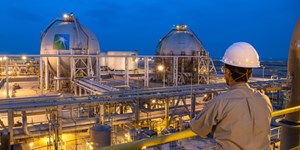Aramco boosts oil ties with China as world frets over supply
(Bloomberg) — Saudi Arabia is strengthening energy ties with China, as the oil producer Aramco agreed to build a multi-billion dollar refining and chemicals project that will tap into the Asian country’s future demand.
Globally, consumers are screaming for fuels as consumption recovers after the coronavirus pandemic, and refiners are delaying maintenance to benefit from high margins. Prices spiked to more than $130 a barrel after Russia’s invasion of Ukraine triggered concern that supply could be impacted. There are signs that Russian oil is being shunned, with a number of tenders struggling to attract buyers. So far, that hasn’t dented demand.
The surge in prices is helping oil producers revive some investment plans put on ice during the pandemic. The Saudis, at the heart of global supply as the world’s largest exporter, are spending billions to raise crude production capacity and pump more natural gas.
Saudi Aramco said it had taken the final investment decision to partner in a refining complex in Panjin, North China after it revived the plan. The state oil company had shelved the project and dropped others, as plunging prices during the pandemic disruped spending plans.
Aramco is increasingly signing deals coupled with crude supply agreements. For the Chinese project, being developed with China’s Norinco Group, Aramco will supply up to 210,000 barrels of the facility’s 300,000 barrel daily crude requirement. The project, expected to start operation in 2024, also includes a chemicals component as Aramco seeks to turn crude directly into the valuable plastics and composites that go into consumer goods like mobile phones, cars and televisions.
The producer isn’t just targeting China. In January, Aramco moved further into Russia’s backyard, buying into Poland’s main refinery company and agreeing to supply crude into the Baltic region that had been traditionally dominated by Russian barrels.
These deals not only guarantee an outlet for Aramco’s crude for decades to come, they also provide its trading unit an opportunity to boost its business of supplying Saudi and other barrels to projects where it has stakes.



